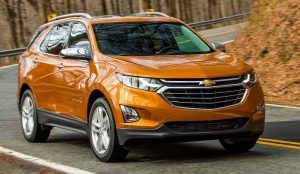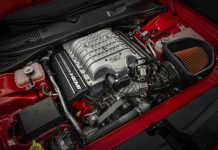Here’s the latest reader question, along with my reply!
Jimmie asks: Hi Eric; do you plan a review of the Chevy Equinox diesel?
My reply: I hope to wrangle some seat time, but it’s become much harder to access GM vehicles due to my falling afoul of GM – which has been punishing me for my politically incorrect attitudes regarding the Diversity (see here) Climate Change and EV shibboleths.
I do, however, have some thoughts on the Equinox diesel and diesels generally.
The summary is that the cost to buy vs. what you save on fuel probably negates any economic advantages in a vehicle such as the Equinox – which is a crossover SUV and so considerations about heavy-duty work/towing don’t apply, as they would if we were discussing trucks or truck-based SUVs (e.g., models like the Tahoe and Suburban).
The price of the diesel-powered version of the Equinox is $29,500 to start – vs. $23,800 for the base trim with the 1.5 liter turbo engine.
The gas engined version rates 26 city, 32 highway (with FWD). The diesel rates 28 city, 39 highway.
So, you’d be paying $5,700 more to get into the diesel – to save about 2 MPG in city driving and 7 on the highway; on average, about 5 MPG overall. It is unlikely you will ever recoup that $5,700 in higher up front costs in fuel savings, especially given that diesel costs significantly more than unleaded regular.
But...
The 1.6 liter turbodiesel will probably give you more driving enjoyment because of its higher torque output (240 ft.-lbs. vs. 203 ft.-lbs. for the gas 1.5 liter engine). In everyday stop-and-got driving, the diesel will feel more powerful and also feel more relaxed as it’s hardly ever necessary to give it more than half pedal to get plenty of acceleration.
Also, there is longevity to consider. The diesel should have a longer service life; however, even that is less true than it used to be because of the complexity (to appease Uncle) of modern diesels. They used to be simpler engines, with fewer parts to wear out. That is no longer true, unfortunately.
So, it comes down more to your personal preferences.
Objectively, the diesel’s high cost and not-high fuel efficiency relative to the gas engine make it a dubious value. But you may value the way it drives more than the gas-engine – in which case, the higher cost might just be worth it… to you!
And in the final analysis, that’s the most important consideration of all.
. . .
Got a question about cars – or anything else? Click on the “ask Eric” link and send ’em in!
If you like what you’ve found here please consider supporting EPautos.
We depend on you to keep the wheels turning!
Our donate button is here.
If you prefer not to use PayPal, our mailing address is:
EPautos
721 Hummingbird Lane SE
Copper Hill, VA 24079
PS: Get an EPautos magnet (pictured below) in return for a $20 or more one-time donation or a $5 or more monthly recurring donation. (Please be sure to tell us you want a sticker – and also, provide an address, so we know where to mail the thing!)
My latest eBook is also available for your favorite price – free! Click here. 












on average, about 5 MPG overall.
That’s it?!?! Wow. And don’t forget to add in the increased road taxes that keep diesel prices high, because everyone knows that diesels go much further on a gallon of fuel… oh wait…
The old VW TDI exhaust had a trap that would capture some of the more nasty stuff that came out the tailpipe. Every so often the computer would run a routine that would shoot a little fuel in that box to burn out all the soot and other large particulates. It was recommended if you were driving in stop and go traffic for extended periods or didn’t completely warm up the engine every time, you take it out on the highway once in a while to force one of these cycles and blow out the trap. When Uncle demanded cow piss be added VW used that trap to inject the DEF, and I believe added a glow plug. My guess is the reason for the horrible fuel economy must be that GM has to shoot a lot more fuel into their version of the trap to comply with Uncle’s demands.
I would think there will be DEF delete kits for this vehicle. Of course you have to live in a place that doesn’t inspect the vehicle and of course it voids the warranty. But it would probably help with the fuel economy and give it some extra performance.
Guessing the exhaust system is probably undersized like most GM vehicles. Its amazing what you can get when you let the engine breathe.
All things being equal, a Diesel should last longer. Because Diesels rely on compression for ignition, the engine has to be more robust to take the heat and pressure that comes with those high compression ratios. What would be high compression for a gasoline engine would be very low for a Diesel. While a gasoline engine is considered high compression if it’s 12:1, Diesels typically have compression ratios of 17:1 to 22:1. That’s a huge difference! Why did those GM Diesels of the 1970s blow up all the time? Because GM tried to take a gas engine and convert it to Diesel; it couldn’t take the stresses, so they blew apart all the time.
When I was younger, though Diesel was worth the premium, but now unless it’s used and depreciated, don’t see a point to buying new for new, unless you’re towing or commute long distances often (My friend does 100 miles a day back and forth to work for example)
Now if you’re looking used and see a good one within your budget and you got a long commute or road trip a lot, then I don’t see why not.
Still, best to deal with ones that don’t have all the crap in them, like Mk6 Golfs or live somewhere that they won’t really check for deletes
On service life, not necessarily true
My 2014 Cruze Diesel ate its engine at 141k because the water pump seized up and caused the timing belt to freeze up at speed. For the gas engine, it would have been a simple matter of doing a timing belt job early and I’d have been back on the road, but the 2.0 Diesel is an INTERFERENCE engine. That shitty water pump cost me >$5k. Find out if the engine is an interference engine first, it could make a big difference WHEN the shitty water pump causes you to break down on the side of the road.